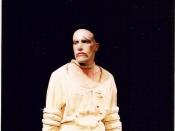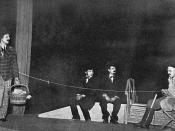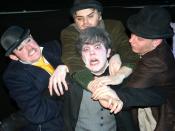a)A Shakespearean clown is supposed to entertain; however, the fool's primary function is to criticize his surroundings by acting silly. He is joking and playing with words; using his wit. So the audiences can read between lines his real message, which is a criticism against society. The clown can see more clearly than others and it is able to explain things that common people can't.
Consequently and according to Serreau's point of view, Vladimir and Estragon-in Waiting for Godot-are clowns since they are representing the man's absurd existence, they are critics towards their society, but more than society, they are criticizing the way humanity lives.
To exemplify, this criticism we can recall the passage below:Estragon: help me!Vladimir: It hurts?Estragon: Hurts! He wants to know if it hurts!Vladimir: (angrily) No one ever suffers but you. I don't count. I'd like to hear what you'd say if you had what I have.
Estragon: It hurts?Vladimir: Hurts! He wants to know if it hurts!..."It is quite clear that there is wordplay in this passage, the way in which the dialogue evolves but at the same time maintains the lines, shows a kind of criticism against man's individualism, a man who generally is not capable of realizing the other's pain; criticizing that there is a lack of empathy between men. Man is able to demonstrate his own suffering, but is unable to see the suffering of the rest.
Another example of criticism is what we can infer from this following passage:Vladimir: Let us not waste our time in idle discourse! (Pause. Vehemently) Let us do something, while we have the chance! It is not every day that we are needed [â¦] but at this place, at this moment of time, all mankind is us, whether we like it or not [â¦] What are...



Arguments about essay
Very creative and nice collection in essay.
1 out of 1 people found this comment useful.